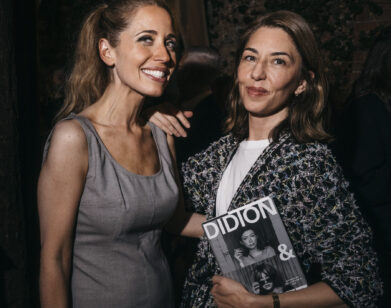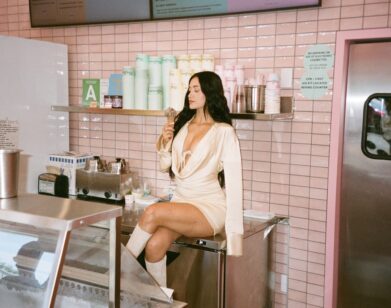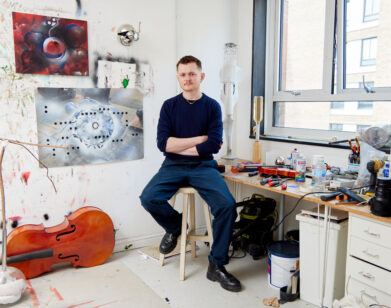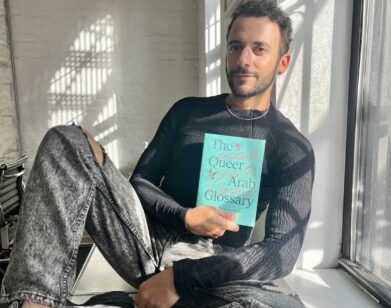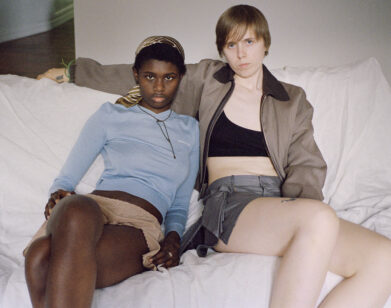Justice Is Served: A Conversation Between RuPaul and Judge Judy
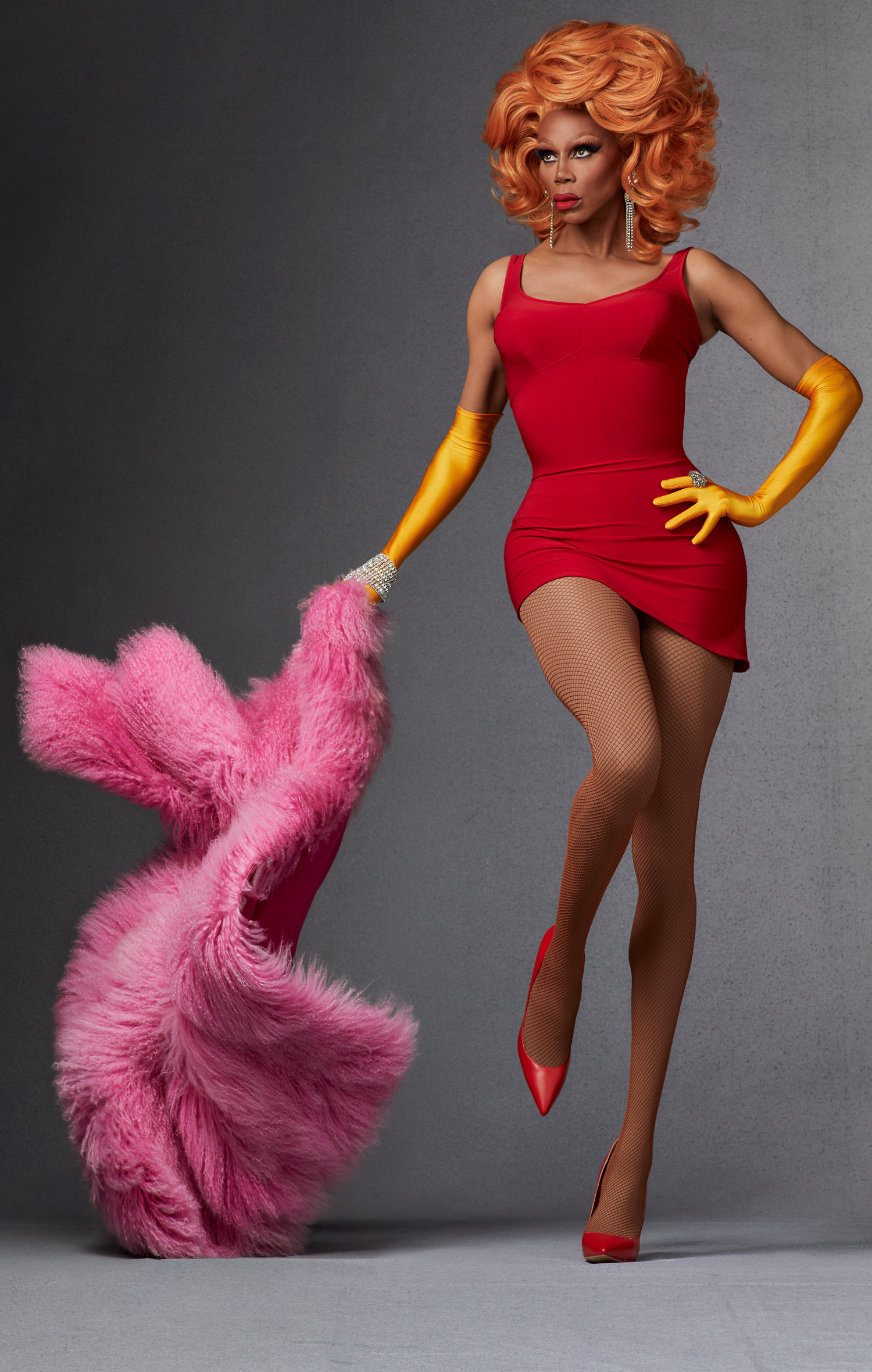
Dress by ZALDY. Faux Fur Coat by ADRIENNE LANDAU BY SAULO VILLELA. Earrings from EYE CANDY. Vintage Bracelet from NEW YORK VINTAGE. Ring from NEIL LANE COUTURE. Vintage Gloves from PALACE COSTUME. Tights STYLIST’S OWN. Shoes RUPAUL’S OWN.
“We’re all born naked. And the rest is drag.” Decades before building his own media empire, even before his reign in the 1990s as one of downtown New York’s most exciting nightlife queens, an 11-year-old RuPaul Andre Charles sat down at his home in San Diego, California, to watch Monty Python’s Flying Circus, when suddenly, everything clicked. The British comedy troupe was silly and liberated and contemptuous of the status quo, and, as Charles once told Oprah, “That’s what this is all about.”
The “this” to which Charles was referring could be any number of things: his music career, which started in 1993 with the release of his debut album, Supermodel of the World; his fashion career, which has included the launch of a unisex fragrance, Glamazon, and a longstanding relationship with MAC cosmetics; or his television career, made up of talk shows, a game show, and, most famously, RuPaul’s Drag Race, a groundbreaking reality competition series that has earned Charles four Primetime Emmy Awards and legions of fans, both from the queer fringes and the cultural mainstream. In truth, he was likely referring to all of those things and more—his podcast (RuPaul: What’s the Tee?, with his close friend and fellow Drag Race judge Michelle Visage), his bicoastal conventions (RuPaul’s DragCon), and, coming soon, his scripted Netflix series AJ and the Queen, in which Charles plays an unconventional guardian to a runaway and which he co-created with Michael Patrick King, the man behind contemporary classics such as Sex and the City and The Comeback.
As Charles told his friend and idol Judge Judith Sheindlin over the phone in June, “Drag reminds people that all artifice is temporary—that all structures are just temporary, and the only thing that stays real is the energy.” That, and a healthy serving of charisma, uniqueness, nerve, and talent.
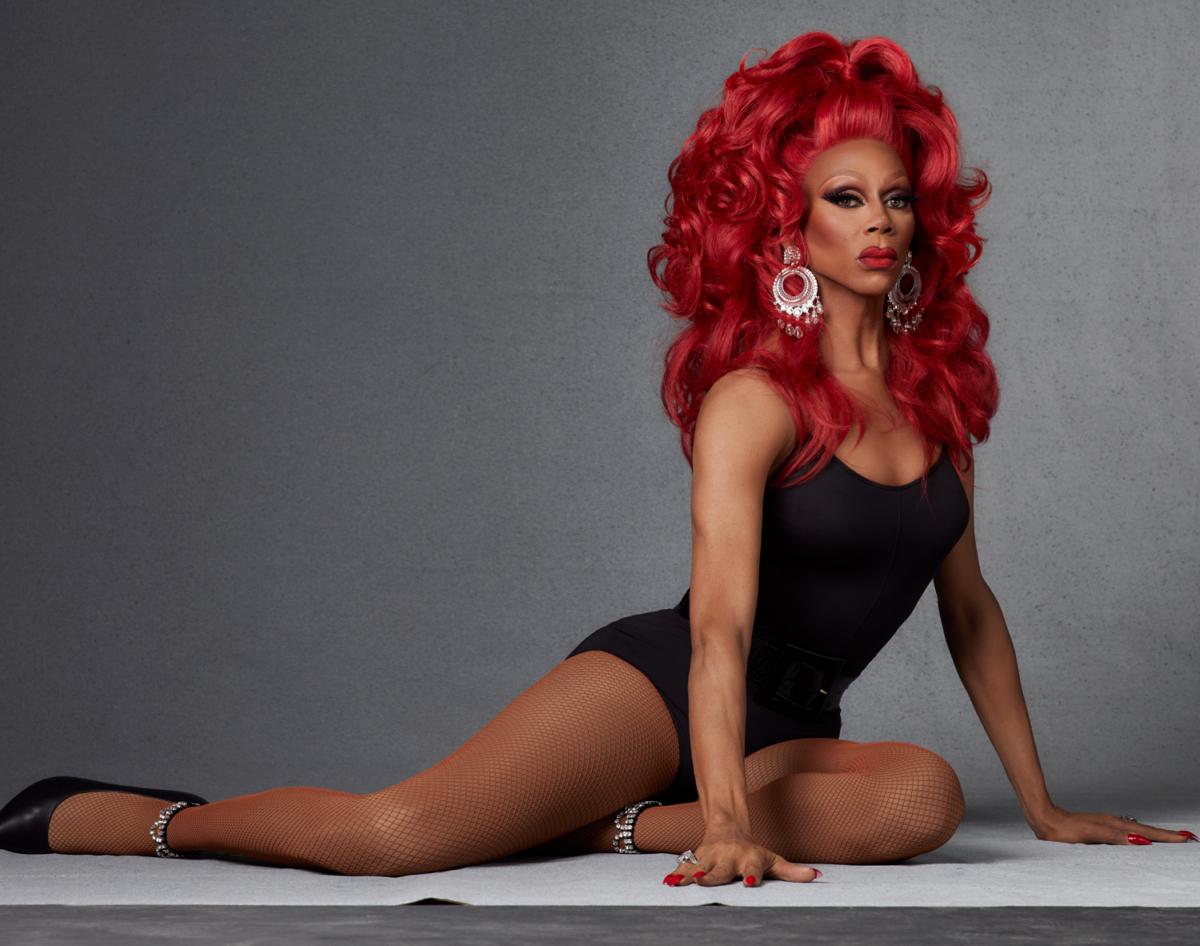
Bodysuit by LIVE THE PROCESS. Vintage Earrings by LARRY VRBA from KENTSHIRE. Vintage Ring from PALACE COSTUME. Chokers (worn as anklets) by AREA.
RUPAUL: You know, I’ve learned so many Yiddish words from watching your television program. One of them is a word that even a lot of people who speak Yiddish don’t know, so I’m going to ask you if I’m saying it correctly: geshikhte. I looked it up, because you once told someone, “Listen, I don’t need to hear a whole geshikhte story here.”
JUDGE JUDY: It’s the difference between reading the Cliff Notes and having to read the whole book.
RUPAUL: Am I saying it right? Geshikhte? I have an app that gives me a Yiddish word of the day.
JUDGE JUDY: Incorporating Judaism into your personality is maybe something you don’t need.
RUPAUL: You know, it’s who I am. I love when cultures and words get mashed up. That’s what makes life interesting. The whole Andy Warhol aesthetic is about mashing up the old with the new to create an entirely new movement. What drag queens do is an identity mash-up. We are men who are doing this superficial, plastic feminine ideal. Drag reminds people that all artifice is temporary—that all structures are just temporary, and the only thing that stays real is the energy.
JUDGE JUDY: It’s like having a white room and adding a splash of something that doesn’t belong.
RUPAUL: It’s funny that we sat next to each other on that plane from New York to Los Angeles all those years ago. I’d been following you before that, but there was a similarity between us that could not be ignored.
JUDGE JUDY: Who would have thought that 20 years later we would be sitting and having this conversation?
RUPAUL: It really has been a fantastic journey. You know, if you live long enough, everything happens to you—the good, the bad, and the ugly.
JUDGE JUDY: Maybe. I haven’t had too much of the bad and the ugly—knock on wood—but I did do my homework before this conversation, and I found out some things about you that, quite frankly, I did not know.
RUPAUL: Uh-huh?
JUDGE JUDY: For instance, I didn’t know that you got married, and that you and your husband had been together for 20 years before that. Tell me, is there a difference to you between living together and being married?
RUPAUL: The difference is really minimal. I met Georges [LeBar] right on the dance floor at the Limelight disco at 6th Avenue and 21st Street on his birthday in 1994. We’ve had our ups and downs and everything in between, and there isn’t a person on this planet I like being around more than him.
JUDGE JUDY: I didn’t meet my husband on the dance floor, I met him at a bar. I walked up to him and I put my finger in his face and said to one of the guys I knew who was standing there, “Who is this?” And he said to me, “Lady, get your finger out of my face.” [RuPaul laughs.] It’s so nice to have that comfortable relationship to come home to, even if it’s once every two or three weeks—because Georges lives in Wyoming, is that correct?
RUPAUL: We see each other about every three weeks. But, you know, we’re adults. We can handle it.
JUDGE JUDY: It’s nice to know that wherever you are, there’s that home anchor. Somebody who’s got your back.
RUPAUL: Someone you know is going to be looking out for your best interests, no matter what. That’s really key. And if you actually like each other, even better.
JUDGE JUDY: You can like a lot of people. The special part is when you love them even if you don’t like them.
RUPAUL: It’s like traveling cross-country with someone—if you can still speak to that person at the end of the trip, you are friends forever.
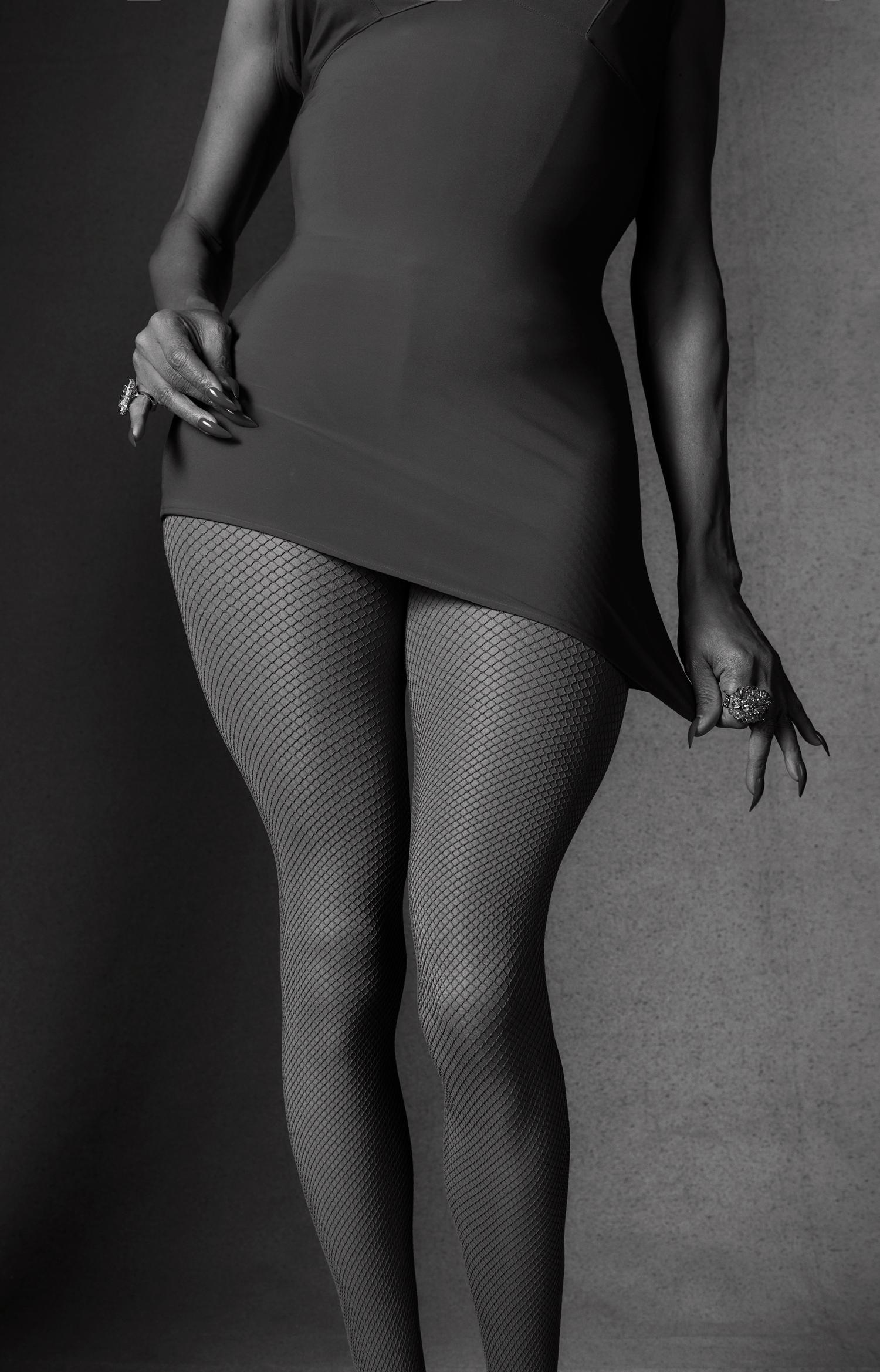
Dress by ZALDY. Ring (on right hand) from NEIL LANE COUTURE. Ring (on left hand) by AMWAJ.
JUDGE JUDY: So you got married in 2017, and then, in 2018, you got a star on the Walk of Fame. That had to have been a sign that RuPaul had gone mainstream.
RUPAUL: Well, my vision of drag is that we’re all born naked and the rest is drag. It’s kind of an existential vision, and it has to do with breaking the fourth wall and seeing yourself from outside of yourself. That’s my drag. But the drag that’s become popular with young people around the world is the surface part of the experience, like, “Oh, pretty makeup. I like her outfit.” So I don’t think drag itself has become mainstream. The superficial part of it has, but the deeper message, which is that we are all extensions of the power that created the universe, is the part that’s not there yet. But, you know, I’m from San Diego, and when I was a kid, we used to come up here to Los Angeles to visit my cousins, and I would always ask to be able to walk down Hollywood Boulevard because I was enamored of fame and all that jazz. As a kid, I knew that the true mark of a legend was having a star on the Hollywood Walk of Fame. I’ve been famous for a long time and I’ve had lots of accolades, but that was a really special one for me.
JUDGE JUDY: Because?
RUPAUL: Because it spoke to that little kid who still lives inside of me. You know, on my new show, AJ and the Queen, my character parents an 11-year-old child, so I was able to really emotionally revisit myself as a kid. It was a trip. I’ve never done anything like that before. It was the most challenging thing for me as an actor and as a human. The big thing for me is that I wish I’d learned how to process feelings earlier. The human body is kind of like a computer program, and a lot of the feelings that I felt were based on the experiences I’d had. Knowing that feelings are not facts was a message I wish that 11-year-old Ru had heard. As I’ve gotten to this stage in my life, I think being able to understand how fortunate you are is a great gift. I feel fantastic. I have my health. I have a good outlook. There have been some great achievements in my career and some really low lows, so I’m not afraid of them. I know that I have an ability to create magic because I have my health and I have an equilibrium. By the way, this is why I’ve tuned into Judge Judy every single day for the past twenty-something years, because it’s like going to the chiropractor to get an adjustment. It’s a reality check, and it’s a great tool for someone like me who’s super sensitive in a world that becomes so overwhelming. That’s why I tune in every day at four o’clock here in Los Angeles.
JUDGE JUDY: Thank you for that. I will count you on my Nielsen ratings.
———
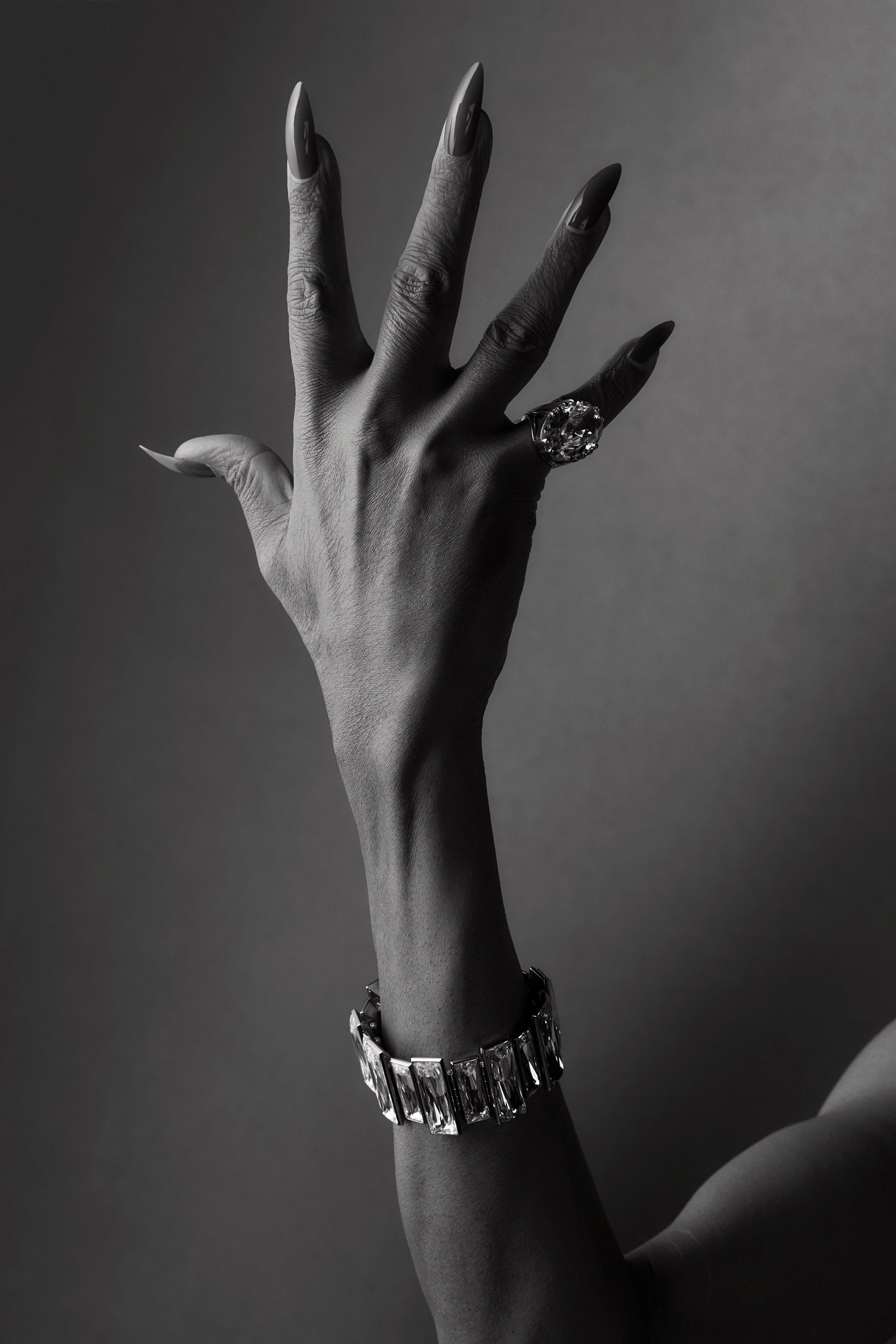
Vintage Ring from PALACE COSTUME. Vintage Bracelet by SIMON HARRISON from KENTSHIRE.
———
RUPAUL: I have a folder on my computer of pictures of people I admire, and there’s a Judith Sheindlin folder. One of those pictures is when you got your star on the Hollywood Walk of Fame.
JUDGE JUDY: Merv Griffin was the person who spoke when I got my star, and he, to me, was the kind of person who had a star on the Hollywood Walk of Fame—not some Jewish kid from Brooklyn who became a lawyer. For me, Ru, it was a little different because my childhood dream was not to be a star. From what I know about you, you always knew you were a star. The world just had to catch up.
RUPAUL: Exactly.
JUDGE JUDY: If I had to define you in two words, they would be “honest” and “flamboyant.” That’s who you are. The fun of you is who you are. And that’s why I think we like each other, because I, too, know who I am. Our messages are the same, really, which is that you have to really like yourself.
RUPAUL: It’s the only game in town, honestly, because when you find your own rhythm, when you find your own frequency, that is your gift to humanity. It’s your life’s work.
JUDGE JUDY: To be your happiest in this journey of life, which has a beginning, a middle, and an end.
RUPAUL: That’s great advice for young people, because some days it’s easier than others to do that. You know, a lot of kids feel special, but they don’t have the critical thinking it takes to make that work in the real world. A lot of people think they’re the cat’s pajamas, but they haven’t put in the actual work it takes to really walk in those shoes. I see it on your television program all the time.
JUDGE JUDY: People like order, and it’s difficult to always follow the rules, but most people do follow them because it’s the right thing to do. So when I see others doing the wrong thing, like throwing trash out of their car window or throwing their gum on the floor, it infuriates me. When I see something that has a negative impact on other human beings, I get furious.
RUPAUL: You and I both. Not only is it disrespectful, but we can’t have a civilization without everyone pitching in. There are rules that I have chosen to break, but when it comes to civil liberties and people’s own pursuit of happiness, that’s when we have a problem. What do you think it’s going to take for people to gain back civility? Could it come back into fashion, like putting air back into a balloon?
JUDGE JUDY: I don’t think it can.
RUPAUL: Well, where are we going then?
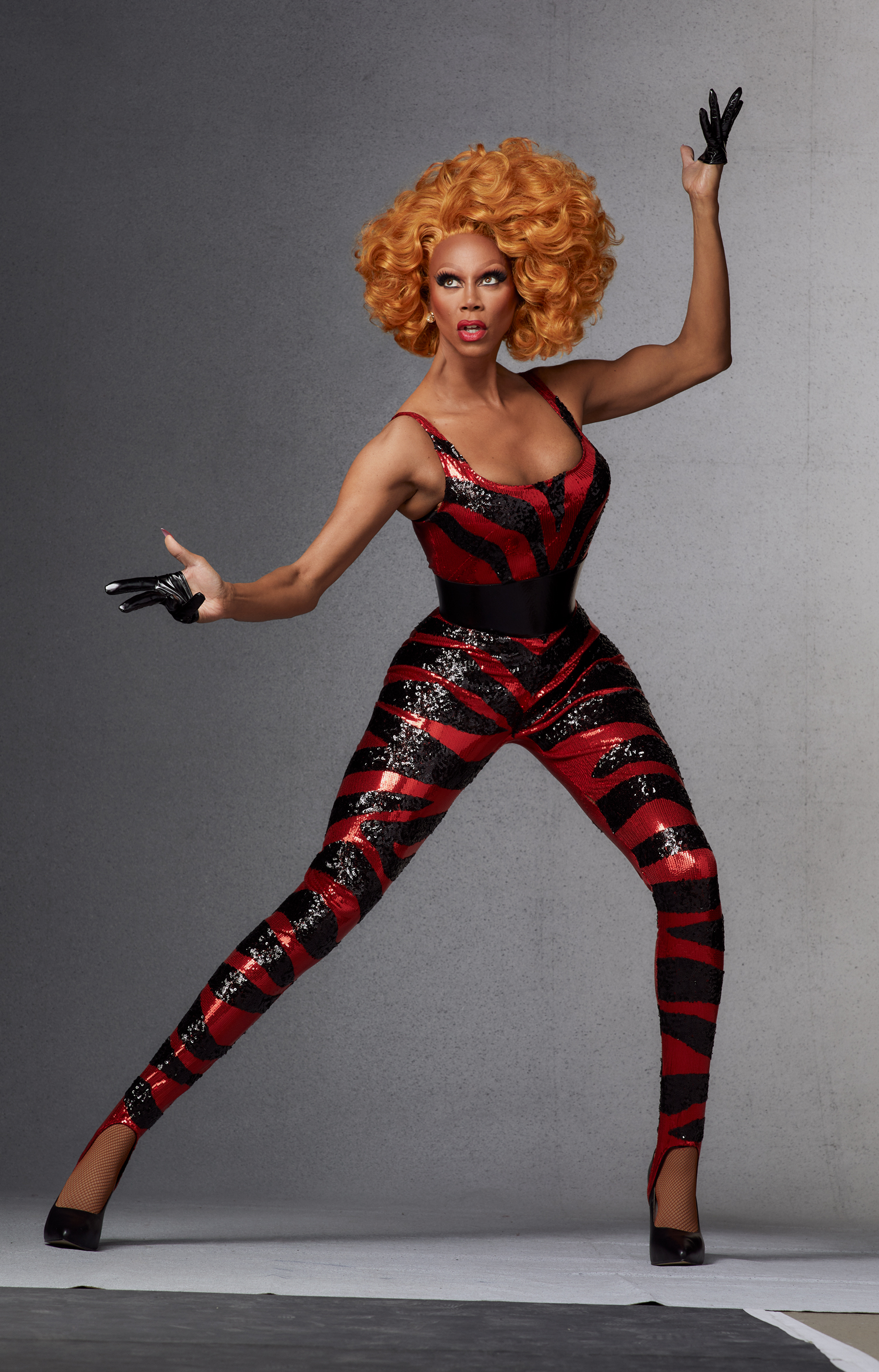
Catsuit and Belt by ZALDY. Vintage Earrings by NETTIE ROSENSTEIN from KENTSHIRE. Gloves by GASPAR GLOVES. Shoes by PLEASER.
JUDGE JUDY: I did my first interview for 60 Minutes 26 years ago, and Morley Safer said to me, “What direction do you think it’s all going in and will it get any better?” And I said to him, “It’s going to get worse. A lot worse.” It’s like what you said before—you watch my program because there’s linear thinking. But there is an element of dumbing down that has been embraced by others, which suggests to me that these rules of civilization are being dulled. What do you think it’s going to take?
RUPAUL: I think all of society would probably have to break down to real chaos before we can build it up. We used to control people with shame or with common sense, but the only way a kid is going to learn is if they run into something horrific and somehow fate teaches them a lesson. And I think that’s where we’re going. All this started when we got cell phones, and you’d be on the airplane and someone would take out their phone and start talking with this huge voice. And it’s like, “Uh, sir, we can all hear you, and not only that, but your phone is equipped to pick up your conversation even if you just speak at a lower level.”
JUDGE JUDY: I’m not interested in hearing you talk to your girlfriend. Or your stockbroker.
RUPAUL: Right, and America is still a young country. We’re like a teenager. After those world wars in the 20th century, people understood the value of peace and civility. Maybe it’ll take something horrible like that for people to get back to the basics of understanding that we’re all in this together.
JUDGE JUDY: With social media, you don’t meet people like you met Georges at the disco, or like I met Jerry at the bar. You meet on a website and you scroll until you find a picture that looks nice and you click it. Then, even when you meet, you sit at a table and everybody’s on their phone. I think it’s one of the advantages of us getting old.
RUPAUL: God forbid, if anything happens and the electrical grid goes down, those people are in for a rude awakening. We’ll have an advantage. How are you able to not just be in constant anger at how the world is today? At how people are not paying attention? Here in Los Angeles, people don’t even stop at stop signs anymore—they come barreling around the corner without stopping.
JUDGE JUDY: I think it comes from a place of just being grateful. I have a family that I adore. I have a career in a profession that I love. It’s the same with your success—you worked hard for it, you have tremendous talent, and you deserve it.
RUPAUL: You’re a real mensch.
JUDGE JUDY: You know what, Ru? You’re a real mensch, too.
———
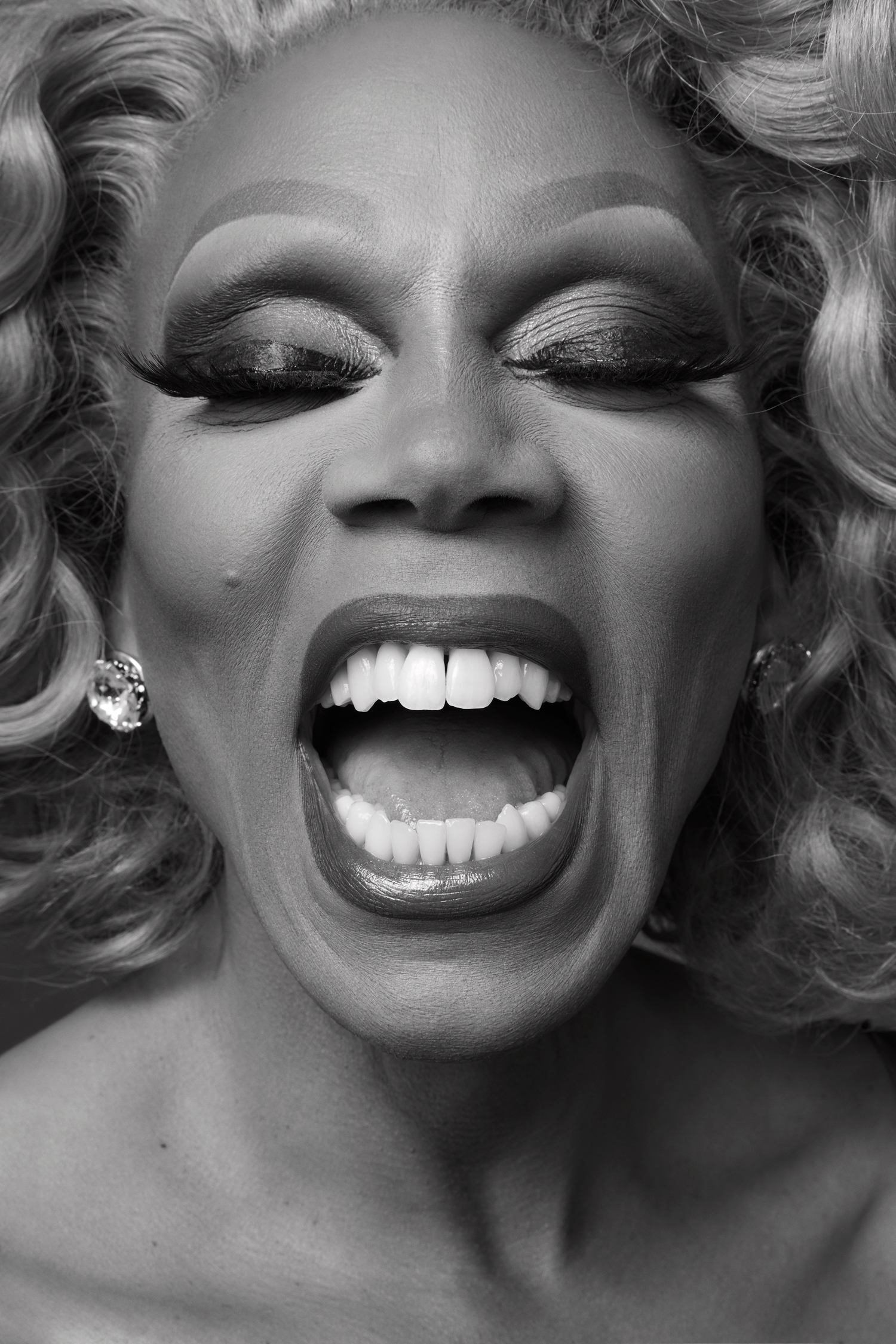
Vintage Earrings by NETTIE ROSENSTEIN from KENTSHIRE.
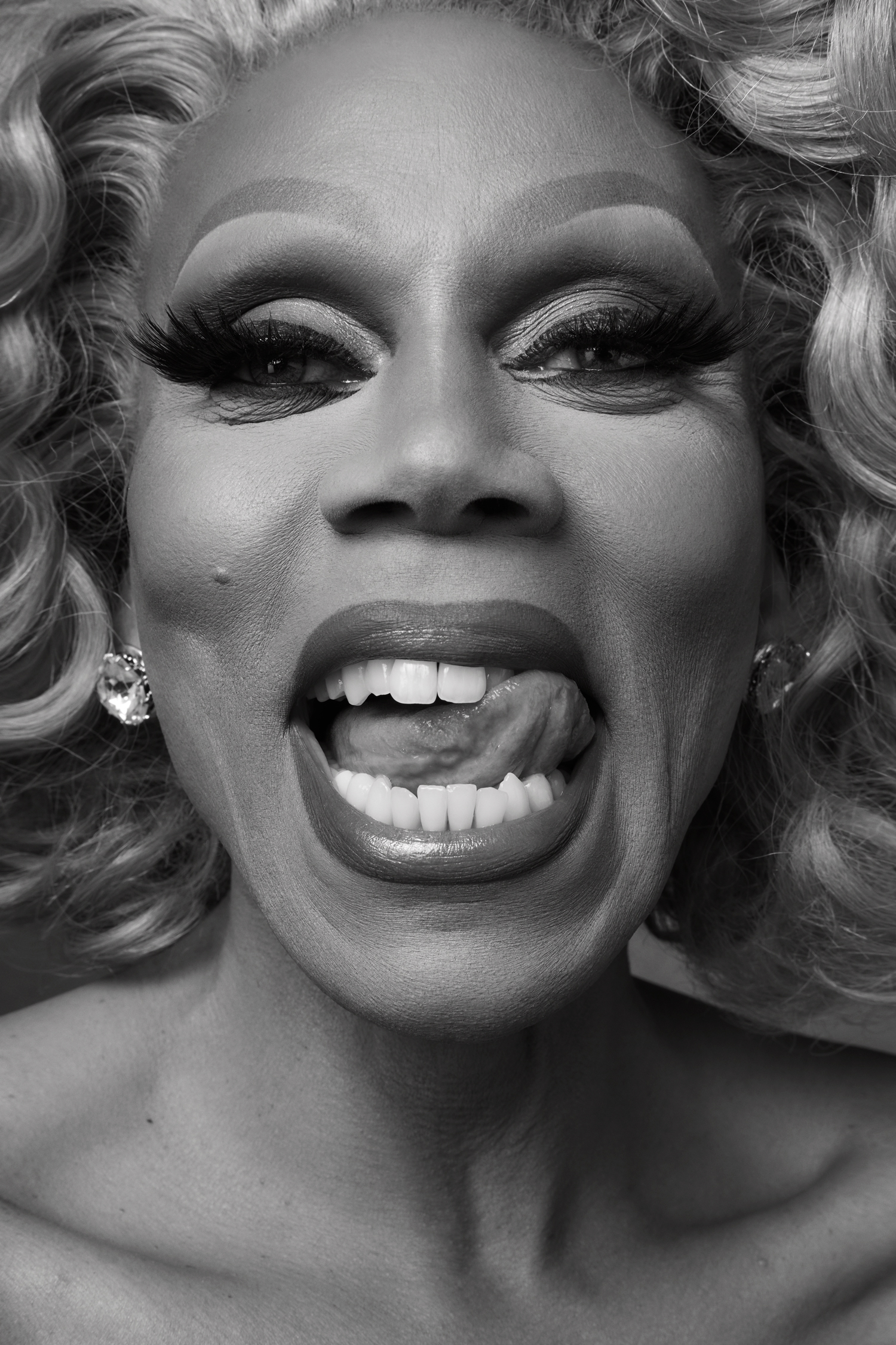
Vintage Earrings by NETTIE ROSENSTEIN from KENTSHIRE.
———
Hair and Wigs: Curtis William Foreman
Makeup: David Petruschin aka Raven
Set Design/Prop Stylist: Julia Wagner at CLM
Production: Cat Lewis at M.A.P.
Digital Technician: Nick Rapaz
Photography Assistants: Jackson Adair, James Sakalian III, and Jack Strutz
Fashion Assistants: Abi Arcinas and Zoe Zhoue
Set/Prop Assistants: Luis Ortega Govela and Marcs Marcus
Production Assistant: Jose Miguel Dao

